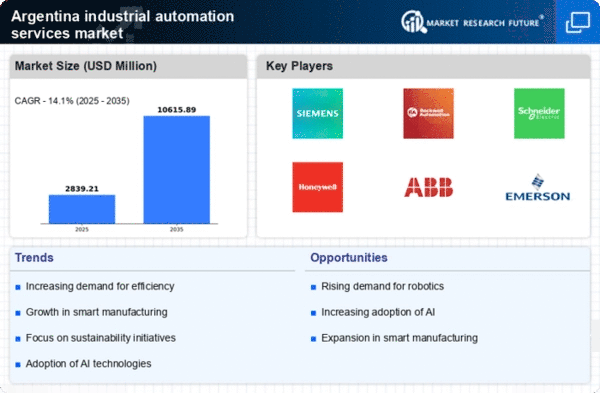Growing Focus on Workforce Safety
Workforce safety remains a critical concern within the industrial automation-services market in Argentina. As industries adopt automation solutions, there is a concurrent emphasis on enhancing safety protocols to protect employees. Automation technologies can mitigate risks associated with manual labor, thereby reducing workplace accidents. Reports suggest that companies implementing automation can decrease injury rates by up to 40%. This focus on safety not only complies with regulatory requirements but also fosters a culture of well-being among employees. Consequently, businesses are increasingly investing in automation services that prioritize safety features, such as remote monitoring and automated safety systems. This trend is likely to drive growth in the industrial automation-services market, as organizations recognize the dual benefits of improved safety and operational efficiency.
Integration of Advanced Technologies
The integration of advanced technologies is a pivotal driver for the industrial automation-services market in Argentina. Technologies such as artificial intelligence (AI), machine learning, and the Internet of Things (IoT) are increasingly being adopted to enhance automation capabilities. These technologies enable real-time data analysis, predictive maintenance, and improved decision-making processes. For instance, the implementation of AI-driven analytics can lead to a reduction in operational costs by approximately 20%. As industries strive to harness the potential of these technologies, the demand for automation services is expected to rise. This trend indicates a shift towards more intelligent and adaptive manufacturing processes, which could redefine the competitive landscape in Argentina's industrial sector. The industrial automation-services market is thus positioned to benefit from this technological evolution.
Rising Demand for Operational Efficiency
The industrial automation-services market in Argentina experiences a notable surge in demand for operational efficiency. Companies are increasingly seeking to optimize their processes, reduce downtime, and enhance productivity. This trend is driven by the need to remain competitive in a challenging economic environment. According to recent data, organizations that implement automation solutions can achieve efficiency gains of up to 30%. As a result, the industrial automation-services market is witnessing a shift towards integrated solutions that streamline operations and minimize human error. This focus on efficiency not only improves profitability but also positions companies to respond more effectively to market fluctuations. The growing recognition of automation as a strategic asset is likely to propel the market forward, as businesses invest in advanced technologies to meet their operational goals.
Shift Towards Customization and Flexibility
The industrial automation-services market in Argentina is witnessing a shift towards customization and flexibility in automation solutions. As businesses face diverse operational challenges, there is a growing demand for tailored automation services that cater to specific needs. This trend is particularly evident in sectors such as food and beverage, pharmaceuticals, and automotive, where unique production requirements necessitate adaptable solutions. Companies are increasingly seeking automation providers that offer modular systems and customizable features, allowing for greater scalability and responsiveness. This shift indicates a move away from one-size-fits-all solutions, fostering innovation within the industrial automation-services market. As organizations prioritize flexibility, the market is likely to evolve, with providers developing more sophisticated and versatile automation offerings.
Increased Investment in Infrastructure Development
The industrial automation-services market in Argentina is significantly influenced by increased investment in infrastructure development. The government and private sector are channeling funds into modernizing facilities and upgrading technology to enhance productivity. This investment is crucial for supporting the growing demand for automation services across various industries, including manufacturing and logistics. Recent estimates indicate that infrastructure spending could reach $10 billion by 2026, creating a favorable environment for automation adoption. As companies seek to leverage new infrastructure, the industrial automation-services market is poised for expansion. Enhanced infrastructure not only facilitates the implementation of advanced automation solutions but also improves overall operational capabilities, thereby attracting further investment in the sector.

















